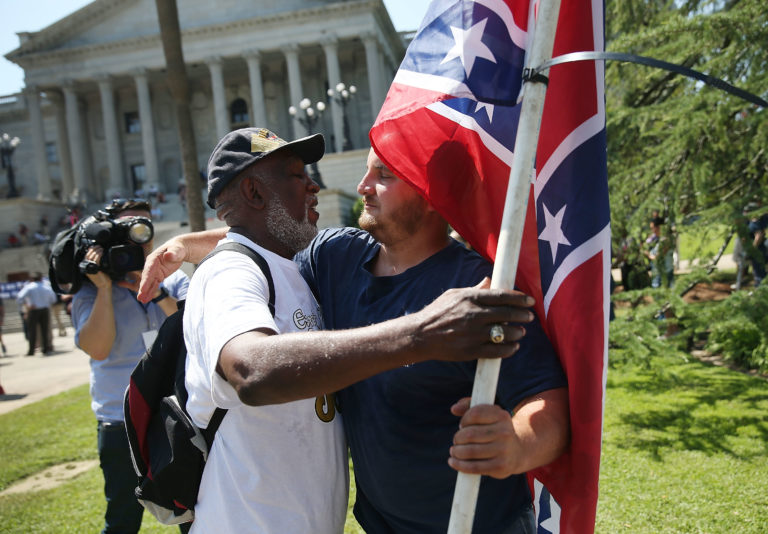
Ernest Branch (L) hugs a man carrying a Confederate flag (who didn't want to provide his name) saying that he respects the fact the guy likes the flag but that he is against the flag flying on the Capitol grounds in Columbia, South Carolina. Image by Joe Raedle /Getty Images..
Transforming White Fragility Into Courageous Imperfection
We were gathered around two round tables, covered in bright yellow and white gingham table cloths, picking at the remnants of our Saturday evening potluck, and talking about what it means to be white in America at this time of such horrific, racialized violence and such powerful uprising. People shared stories about their frayed familial roots, expressed anger and grief and confusion about how to act (especially locally), and yearned, together, for this moment to be one that our children might look back on and say, “That was when white people finally, really took a stand.”
Naïve? Perhaps, but it somehow feels like the only appropriate response to something as horrific as the shootings at the Emanuel AME Church last week in Charleston. Coupled with rigorous self-examination and strategy, we must be bold enough to aim for historic and incontrovertible change. We must cling to urgency. We must not settle for another breaking news moment that falls off of our radars and into the black holes of our white consciousness.
Black people, people of color in general, don’t have the luxury of forgetting, especially as long as white people, particularly the “good ones,” remain so fragile.
“White fragility” — it’s a term I had never heard before Saturday night. A friend uttered it in reference to how so many white people respond when challenged about racism, and I felt like someone had turned the lights on. It was one of those moments when you hear language that wraps around something you’ve experienced or witnessed, but found impossible to describe. What clarity. What relief.
White fragility is, at its essence, gut level pushback. It’s like the fight or flight response of white people who want to believe that they, and the world by extension, are less racially divisive than they really are. It’s when you feel like the wind has been knocked out of you when a person of color points out that something you’ve said seems rooted in a privileged experience of the world. It’s when you desperately want to defend why a well-intentioned institution that you’re a part of isn’t really racist. It’s when you evade talking about certain parts of who you are for fear that it will make you vulnerable for critique from people of color.
Dr. Robin DiAngelo has done work for many decades helping people understand how to think, talk, and act on issues of race and privilege. She writes:
“It became clear over time that white people have extremely low thresholds for enduring any discomfort associated with challenges to our racial worldviews. We can manage the first round of challenge by ending the discussion through platitudes — usually something that starts with ‘People just need to,’ or ‘Race doesn’t really have any meaning to me,’ or ‘Everybody’s racist.’ Scratch any further on that surface, however, and we fall apart.”
Where does this come from? You would imagine that white people would be stronger, not weaker, that they would be emboldened to take in new viewpoints from their position of privilege. But we are deathly afraid, even if unconsciously, of falling off the pedestal. Progressives who align with anti-racist organizing want to prove that we are the “good ones.” Our fragility is born of our desperation to be seen as morally flawless in the eyes of people of color and other white progressives. We reject white supremacy, and yet, we are emotionally invested in a variant of white purity — somehow believing that we can transcend the very system that has given us our privilege, the very system we purport to want to fight against.
I’m grateful for a framing that helps me understand my own fragility. Experimenting with how I use the power that comes from my privilege is a messy process. Sometimes I feel like I manage to do something really useful in the world, whether its recommending a brilliant person of color to speak at a conference and working with them to hone their transformative message for a broad audience or saying I won’t speak on a panel that I’ve been invited to because there isn’t a person of color on it. Interestingly, white fragility often shows up as talking a lot, a kind of flood of effortful explaining, or the equivalent of a peacock’s display of anti-racist sentiment — posting on social media with great fanfare or calling out other white people with a sort of zeal.

Sometimes I feel like my good intentions don’t lead to great results. I recommend that person of color and then end up feeling like they have a tokenizing experience that further isolates them and their brilliant ideas. In these moments, I sometimes feel the fragile part of me rear up. I swear off these kinds of efforts, both because it wasn’t a positive experience for the person I recommended, but also because I don’t want to risk feeling like I’ve messed up. When fragile, I don’t trust the resilience of my relationships or the power of speaking plainly about the failures and moving on. I have been revealed to be imperfect within a system that I am all too happy to point out is imperfect. I have been revealed as part of the mess of traumatized, grasping, healing humanity.
It can be subtle stuff, I admit, and yet I’m convinced it’s related to the anything-but-subtle violence in places like Charleston, like Cleveland, like George County. If white people want to belong to the beloved community, if we want to be part of the tide that is turning thanks to people of color-led movements like #BlackLivesMatter, then we have to show up as bold and genuine and imperfect. We have to be weary of our fragility. We have to be intolerant of our own forgetfulness.
If it feels difficult, and it does to me, you’re probably on the right track. Dismantling centuries of dehumanizing institutions and practices — both in the world and within ourselves — can’t be a simple process. The good news is that transforming your fragility into courageous imperfection is the beginning of a lot more joy. It’s the beginning of a lot more connection. It’s the beginning of the end of racism.


Share your reflection